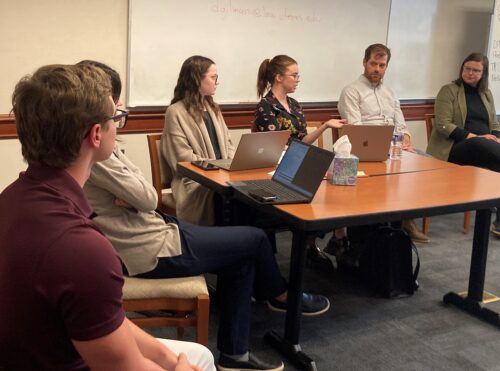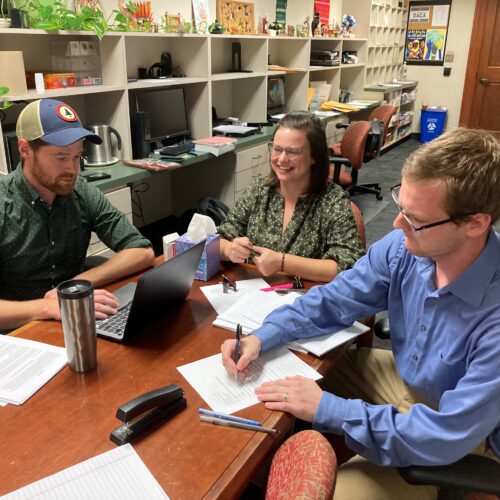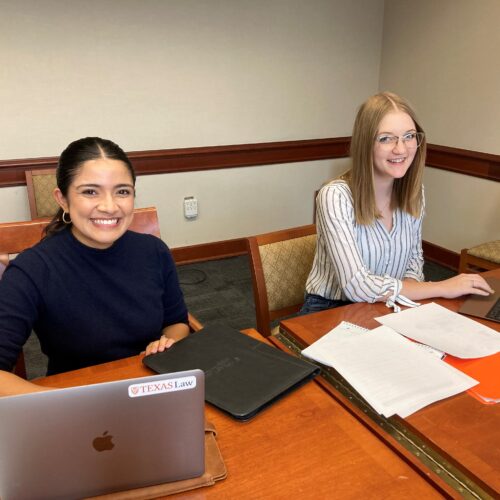
Texas Law students debrief following initial applicant interviews at the Pro Bono Workshop in October.
It’s been more than a year since U.S. troops withdrew from Afghanistan, but vast numbers of Afghans forced to flee the country once the Taliban regained control are still seeking legal standing to make new lives for themselves in the United States. Of those who managed to make the 7,800-mile journey from Kabul to Texas, a group of 20 were able to take crucial steps towards being granted permanent asylum with the help of Texas Law students.
“Assisting these asylum seekers is hard work but absolutely rewarding,” said 3L Diane Duan, who is one of 46 law students working under attorney supervision through both the Texas Law Immigration Clinic and the Richard and Ginni Mithoff Pro Bono Program to provide legal support for the Afghans hoping to now call Texas home. “They were forced to abandon everything they are familiar with —their homes, their belongings, and in many cases, their family—only to find themselves in a country where they don’t speak the language, navigating a legal system that’s complex and unfriendly.”
Adds Duan, “I’m honored to be able to help them. Everyone has a life story, and as we got to know these people’s stories, we humbly learned their difficult and respectable journeys.”
Through the efforts of Duan and her fellow student advocates, six of the Afghan evacuees were finally granted their asylum during the fall. More positive outcomes are expected, but, for now, the students and the asylum seekers must wait to learn of their fate. Meanwhile, 12 new Afghan evacuees working with students from the Pro Bono Program in October have just completed applications for asylum.
News on these new applications, as well as those outstanding, may not come until well into the new year. Although the U.S. government states that it is expediting asylum claims by Afghan evacuees—with asylum interviews being scheduled within 45 days of an application being processed— decisions typically aren’t delivered until several months later.
The delays, while difficult to endure, don’t diminish the importance of the work or the feeling of accomplishment in doing it.

Daniel Woodward ’23, Megan Day ’24, and Tyler Larsen ’23 are Mithoff Pro Bono Scholars on the immigration team.
That work includes explaining the lengthy and complex legal process to the applicants, completing the asylum applications, gathering corroborating evidence and documentation, preparing affidavits and legal briefs, representing applicants at an asylum hearing, and delivering a closing statement to the hearing officer.
“Our students are providing services with real value to these asylum applicants – meeting with them, listening to their stories, and completing their applications in a way that allows the asylum officer to understand their stories as well,” said Elissa Steglich, who, with Denise Gilman, serves as co-director of Texas Law’s Immigration Clinic. “The process includes overcoming language and literacy challenges, as our students demonstrate compassion while gaining hands-on experience.”
The Afghans come from a variety of backgrounds, including ethnic minorities, a journalist, human rights educators, and numerous individuals who assisted or served with U.S. forces. When they arrived in the U.S., most were provided temporary permission to be in the country, with two years to establish a legal basis to remain.
For 2L Umul Lalee, the opportunity to help these Afghans is especially profound. Lalee’s family came to the U.S. from Afghanistan when she was just 5 years old, seeking a better life for Umul and her five siblings. And because Lalee’s native language is Dari, the official language of 35 million Afghans, she has been able to help bridge language barriers during the process.
“As an Afghan refugee myself, I am so proud of the work and resources the Immigration Clinic has committed to the Afghan community,” said Lalee. She and her clinic partner, Tyler Larsen, have filed nine humanitarian parole applications, and are currently working on an expedited asylum application.
Lalee said the experience has allowed her to give back to her community and develop valuable legal research, writing, and advocacy skills. “It has certainly been challenging, as the process is very new and still developing, but in addition to being able to give back to my community, I’ve also gained insight on my own beginnings and the process my family and I went through to secure residency in the U.S.”

Law students Lizeth Badillo García and Mackenzie Rhine volunteer at the Pro Bono Workshop.
The opportunity for Texas Law students to work on these asylum claims came about through collaboration between the law school’s Mithoff Pro Bono Program, which empowers students to use their developing legal knowledge and skills to address unmet legal needs in the community in an extracurricular setting, and the Immigration Clinic, in which students provide direct legal services, under faculty supervision, for credit, and in the context of coursework.
“This partnership on the Afghan asylum workshop was a wonderful opportunity,” said Andrea Marsh, director of the pro bono program. “For students who aren’t enrolled in the Clinic course to be able to explore immigration law, to work with asylum seekers, and provide an important service to the people they worked with, is huge. I was so proud of all the time and energy they dedicated to these cases, which they volunteered to do on top of their coursework.”
The opportunity for Texas Law students to work on these cases came about through the Immigration Clinic’s connection to Refugee Services of Texas, a non-profit organization that supports asylum seekers, evacuees, immigrants, and other displaced people.
“When these families arrived in Austin, their top concern was finding an attorney to make sure that they could secure a future for themselves and their children,” said Chloe Scarborough, the associate director of resettlement for Refugee Services. “We are so grateful to the clinic and pro bono program for the students’ time and efforts to make a difference in these families’ lives. The students showed skills and poise in their work and conversations. I know they have great careers ahead of them!”
